19 Ways Youth Delivered for Gender Equality in 2019
2019 was the year of youth. From the millions of young people worldwide who walked out of their classrooms and marched for action on climate change to those who stood up and spoke out for their rights in places like Hong Kong, Sudan, Lebanon, and India, young people have led us in demanding a better world. Women Deliver’s constellation of 700 Young Leaders and Alumni were no exception. Here are just 19 ways they broke barriers and built a more gender-equal world:
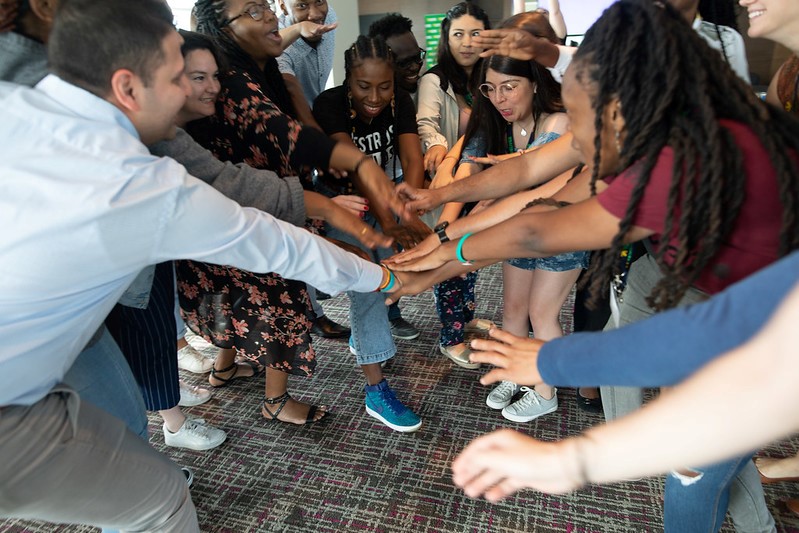
Young Leaders, Alumni, and Women Deliver staff come together for a regional workshop in Panama City.
1. Rising as political stars.
As we witnessed 34-year old Sanna Marin become Finland’s next leader and the world’s youngest-sitting prime minister, Women Deliver Young Leaders also rose to political leadership in their communities and countries. In Senegal, Marième Soda Ndiaye, 27, assumed the role of a deputy in the country’s National Assembly and Carlo Angeles of Peru, 26, continued to make strides as an elected member of Lima’s city council.
2. Sparking national debates.
In Ecuador, Bernarda Ordonez Moscoso, 28, addressed the National Assembly ahead of a crucial vote on a proposal to decriminalize abortion in cases of rape and fetal malformation. Despite prevailing conservative attitudes in a country where girls and women are forced to carry their unwanted pregnancy to term even in cases of rape, Bernarda made a compelling case for decriminalization before legislators. Although the proposal fell short only five votes of the 70 needed for passage, it sparked a long overdue conversation in the country, helped shift mindsets, and laid the foundation for future gains. “We lost, but we won a lot,” Bernarda said.
3. Speaking truth to power.
18-year old Natasha Mwansa from Zambia captivated the 8,000+ attendees at the Women Deliver 2019 Conference when she boldly made the case to put girls and young people in positions of power so they can have a say in decisions that affect them rather than relegating them to the backseat as beneficiaries. “We are not going to be beneficiaries. That’s not happening anymore. It’s 2019. Give us power,” she proclaimed from stage – resulting in a standing ovation from heads of state and the audience. And Natasha wasn’t the only one who made her voice heard – more than 1,400 young people converged at WD2019 and showed #ThePowerOf Youth.
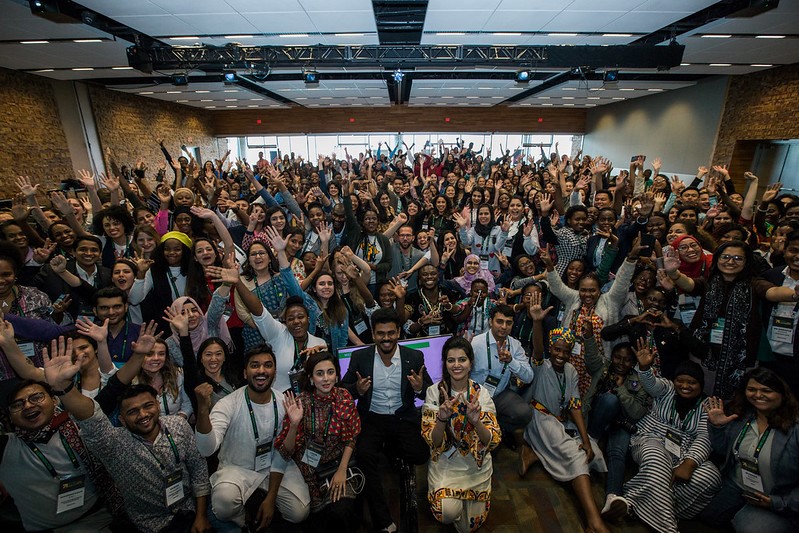
Young Leaders and Alumni gather for a workshop at the Women Deliver 2019 Conference in Vancouver, Canada.
4. Mobilizing resources.
Around the world, millions of girls and young women miss school each year because they lack access to feminine hygiene products, undermining their prospects for completing their studies. In Nepal, 23-year old Krishna Sharma along with local advocates successfully pushed government officials to allocate funding for free sanitary pads in public schools across the country. In May, the federal government announced its new fiscal year budget, which included a line for free sanitary pads in all public schools.
5. Forging solutions so no one is left behind.
In Rwanda, 26-year old medical doctor Costase Ndayishimiye worked with advocates and members of the deaf community to incorporate 200 new sexual and reproductive health specific signs into local sign language glossaries. Now, thousands of people with hearing disabilities in the country can communicate more effectively about their health needs and better access existing health services. They are also better able to report gender-based violence by using signs that distinguish between sex for pleasure and rape.
6. Re-opening doors.
In Sierra Leone, 30-year old Nnamdi Eseme, a recipient of a Women Deliver small grant, alongside his team at EducAid, contributed to efforts to overturn a policy that banned tens of thousands of pregnant girls from attending school since the policy came into effect in 2015. In a landmark ruling this December, a regional West African court ordered the Sierra Leonean government to immediately lift the ban, and integrate sexual education into the nationwide curriculum to reduce teen pregnancies and spread awareness about contraception. “The Women Deliver small grant has given me an opportunity to amplify my voice and to meet with some of the big players in the space,” Nnamdi said. “Our activities will continue, as we seek to solidify this win and build on our network.”
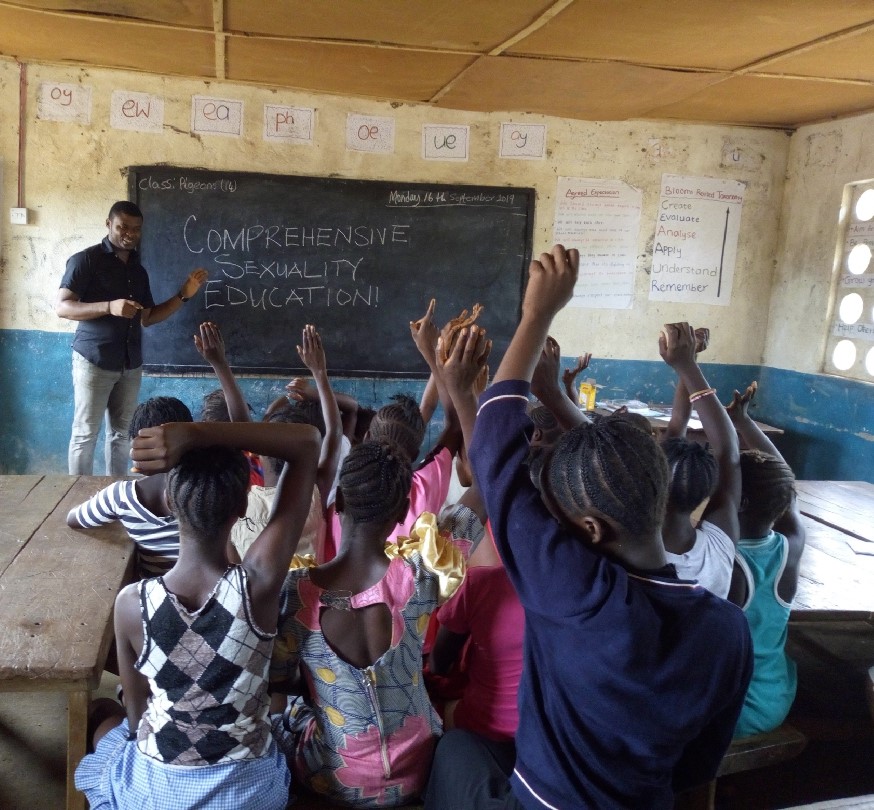
Young Leader Nnamdi Eseme leads a lesson with girls in Sierra Leone. Photo courtesy of Nnamdi Eseme
7. Activating through art.
Rand Jarallah, 28, of Palestine describes herself as a “passionate artivist” (a combination of an artist + an activist) who has been using make-up to draw attention to gender-based violence and displacement. At WD2019, she took to the main stage to share how she infused creativity in her campaigns and used make-up to make change. “For me, art is a global language that transcends all boundaries. It truly has the power to change the world,” Rand said.
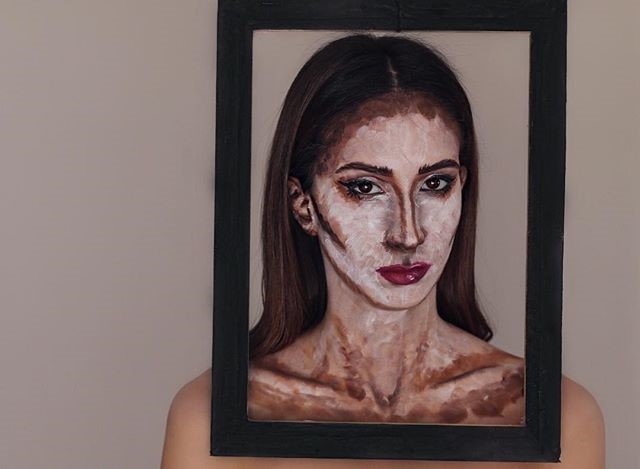
Rand Jarallah uses make-up to create change. Photo courtesy of Rand Jarallah
8. Changing the narrative.
In India, where rape cases routinely make headlines, researcher and advocate Asmita Ghosh, 26, launched a media ethics guide on reporting sensitively on gender-based violence. The toolkit contains an overview of reportage on the issue and provides guidelines on how to use language in a manner that upholds the rights and dignity of survivors of sexual violence. Since its launch, Asmita has promoted the toolkit among journalists, editors, and students across the country — and her work around changing the narrative for survivors has been widely featured in the media, including TV channels and Newslaundry, a respected media ethics website read by hundreds of thousands of Indians.
9. Spreading the power of knowledge.
Noting the wide gaps in knowledge and resources for young people in her home country of Paraguay, coupled with the high rates of teenage pregnancy there, 27-year old Luciana Amarilla has led workshops with more than 760 teenage boys and girls to provide them comprehensive sexuality education. Through her work with her organization Kyña Aty and a partnership with the Asunción city council, Luciana plans to reach hundreds more young people so they can make informed decisions about their health and wellbeing.
10. Convening for change.
Through their organization SRHR Adventures, medical doctors Faqueeda Watson, 29, and Patricee Douglas, 28, have been challenging taboos around sexuality and sexual health in Guyana. The pair has worked with hundreds of young people to help them better understand and advance their sexual and reproductive health and rights. Inspired by WD2019, they worked to organize the country’s first-ever symposium on infertility. “Infertility is such a big issue that affects many women,” said Faqueeda “but no one speaks about the man.” Through this symposium, they were able to engage both women and men on this topic and begin dismantling discriminatory attitudes that blame women for being unable to have children.
11. Gaining commitments.
In Nigeria’s Nasarawa State, Boris Nwachukwu, 26, worked with 147 religious leaders from both Muslim and Christian communities and legislators to advance the Violence Against Persons Prohibition Act, a key piece of legislation that aims to safeguard girls and women from violence. Boris and his team have spoken to 4,000 people to garner a grassroots movement. As a result, he secured commitments from two legislators to sponsor the bill in the next legislative session and widespread support from religious leaders on this issue.
12. Harnessing technology.
Desire Habonimana engaged legislators in Burundi for the widespread adoption of an existing digital platform to promote maternal health. This year, Desire, 34, met with dozens of parliamentarians and other officials to introduce them to the platform, which has already helped scores of women in rural areas – where hospitals and clinics are fewer in number and harder to reach – have access to health professionals during their pregnancy through their mobile devices. Desire is working with the government to scale up this effort to support more women.
13. Sharing expertise (while rubbing elbows with royalty).
Earlier in the year, Dr. Ephraim Kisangala, 30, a public health student at Bangor University, had the opportunity to meet with Meghan Markle, the Duchess of Sussex, and share his insights about refugee health issues in Uganda and menstrual hygiene management in refugee settlements.
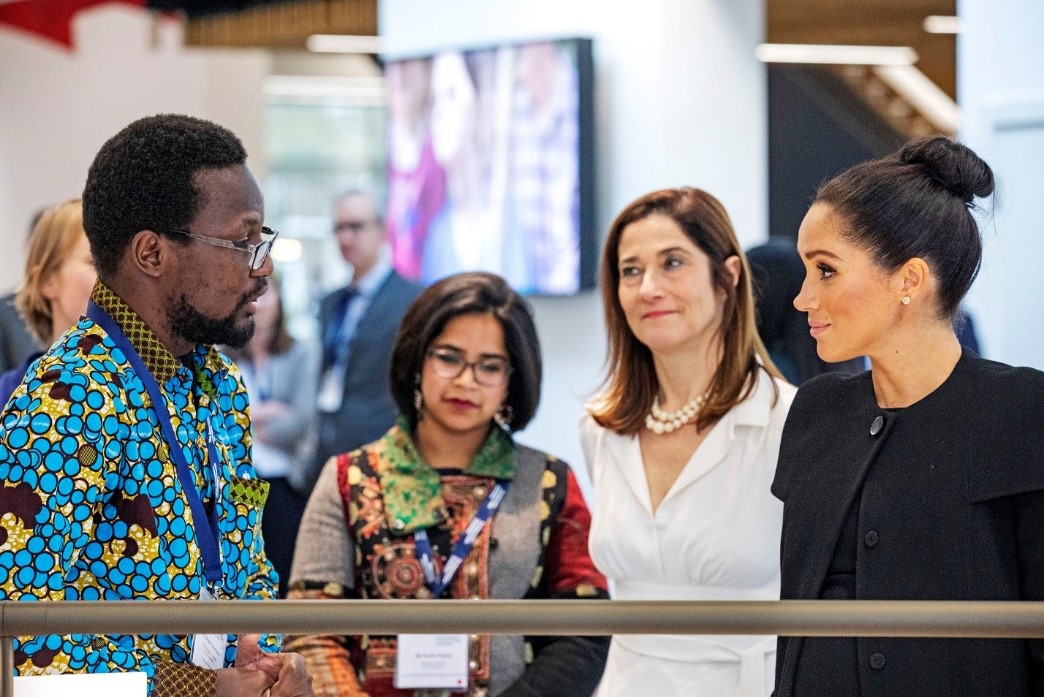
Young Leader Ephraim Kisangala meets with Meghan Markle. Photo courtesy of Ephraim Kisangala
14. Pioneering safety in the workplace.
In Romania, where many women experience harassment in the workplace, 25-year old Georgiana Epure is bringing together employers from the public and private sector to draw attention to this pressing issue and enlist their support in preventing gender-based discrimination and harassment in the office setting. Earlier this year, Georgiana hosted a conference and training for human resources staff and employees to develop internal policies and mechanisms to address harassment. Her efforts not only helped break the silence in the country about workplace harassment, but have also led employers launching initiatives to safeguard their employees.
15. Advocating for survivors.
In Nigeria, Oluwaseun Ayodeji Osowobi, along with her organization Stand to End Rape, made strides in challenging a pervasive culture of violence against women. Together, they have reached over 200,000 people with training, counseling, and support. Recently, Oluwaseun collaborated with the BBC on #SexForGrades, a documentary that exposed sexual harassment in academia. As a result, the Nigerian government is responding with legislation and 15 lecturers have been terminated from their posts for sexual harassment offences. Oluwaseun’s efforts earned her a spot on Time Magazine’s #TIME100Next list.
16. Using theater to effect change.
Joshua Dilawar, 26, used the stage to draw attention to pressing social issues in Pakistan. In April, he organized a performance at the Rwadari Festival 2019 with the support from members of marginalized communities, including domestic workers, farmers, and trans people, to spark dialogue around a host of issues such as gender inequality, domestic violence, harassment, lack of health facilities, early and child marriage, and forced conversions.
17. Powering change through poetry.
Deneka Thomas of Trinidad and Tobago used poetry to inspire change. This year, Deneka, a 27-year old award-winning poet and advocate, has been on a tour of 50 schools across Trinidad and Tobago with the 2 Cents Movement, where she is using poetry to talk youth out of violent extremism and gang violence, an issue that continues to plague the island nation.
18. Dispelling Myths.
Mark Gachagua has seen how unintended pregnancies have disrupted the lives of many girls and limited their futures in Kenya’s Nandi County. On World Contraception Day 2019, Mark, 28, helped organize “My Options, My Future,” an event attended by more than 500 young people where they learned about various methods of birth control and dispelled myths and misconceptions about modern contraception.
19. Turning the tide.
Together with a network of civil society groups, Mariana Mancilla hosted a series of events to advance the decriminalization of abortion in Mexico’s Oaxaca state. As a result, in a 24-10 vote, the state legislature passed a bill that legalizes abortion during the first 12 weeks of pregnancy in the state. Advocates hailed this as part of the first ripples of a “green tide” in Latin America, a reference to the green bandanas that symbolize the abortion rights movement in the region.
Are you a young advocate who wants to join these inspiring Women Deliver Young Leaders and Alumni in building a gender-equal world? Women Deliver will be opening applications for the next class of Young Leaders in January 2020. Sign up for our newsletter to receive updates when the application opens.


